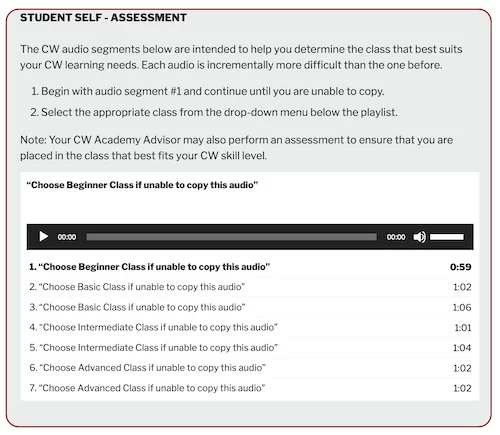Session 10 covers Q, X, Z and <BK>. The audio file (thank you again, Mateo) is here – 25cpm rate, 7wpm Farnsworth spacing.
Welcome, Session 01, 02, 03, 04, 05, 06, 07, 08, 09, 10, 11, 12, 13, 14, 15, 16
In the official CWOPS Beginner Book, session 10 is divided into copying segments:
K, J, 8, 0, X, Q, Z, <BK> (five times each)
WL, UR, OK, HW?, QRX, RIG, WX, ANT, PWR, KW, NAME, MEMPHIS, NYC, SF, DALLAS, HOUSTON, NM, NJ, CA, UT, AL, AR, IL , IN, ME, MA, CT, CO, QRM, NE, SD, ND, PA, KY, FL, NC, SC, SDGO, LAX, LA, ON, SK, MB, NT, AB, QC, NB, NS, NR, RST, UK, USA, TOKYO, PARIS, LONDON, HAMBURG, SYDNEY, ZL2TT, VK4OM, JE1TRV, BA1CW, KH6LC, AL2A, AA3B , 8044, 7400, 73, U HV QSB, U HV QRM, NAME?, QTH?, QTH IS NY, QTH IS PARIS, PSE QSY TO 7054
And sending segments:
WL, UR, OK, QRX, RIG, WX, ANT, PWR, KW, QRZ, QTH, QRS, QRO, QRP, ZL2TT, VK4OM, JE1TRV, BA1CW, KH6LC, AL2A, AA3B, 8044, 7400, 73, UR RST IS 579, QTH IS NR TULSA, NAME IS BARRY, UR RST IS 559, QTH IS DAYTON OH, NAME IS JOHN
Following up to questions:
1) Morse Code Translator is one of the components that Stephen Phillips has put together on his web site morsecode.world. He also has a decoder. I think the intended reference was the CWOps Morse Code Trainer here. This is the browser-based way to run through the beginner lessons. There are some keyboard shortcuts (hit the ? key for the list) that make this easier to go through. The mp3s complement the site and take advantage of hands-off time such as in the car.
When I took CWA, one went from Beginning into Intermediate. Although I passed Intermediate, I was not CW-happy the last few weeks, as I was struggling with the speeds. Since I’m apparently not the only one (haha), CWA added the Basic class as a bridge. For your edification, there is a self-assessment tool midway down the page that can help you see how far you’ve progressed since the start:

The basic course makes heavy use of this for the ICR (instant character recognition). After you have a success rate of 80-90% the first time, they advance to the most common words. It starts with a 25 character per minute rate, Farnsworth-spaced out to 4 words per minute, then gradually speeds that up. For reference, Mateo’s most recent couple of MP3s have been at 25cpm with 7wpm rate. The curriculum for Basic is here, Intermediate here.
2) Practice files (beyond W1AW) – Each of the next three classes has sample short stories and QSO practice files. For example, these are the ones for the Basic Class and Intermediate Class. The intermediate class stories and QSOs come in 10, 13, 15, 18, 20, 25 and 30wpm speeds.
The sample stories are intended to be very repetitive and will never be made into a motion picture — “A STORM = LAURA LOOKED OUT THE WINDOW. A STORM WAS COMING. THE SKY WAS GETTING DARKER.” — because they want you to start letting go of things you are unable to copy the first time. The repetitiveness is easier to do this with than some random, out-of-context QST excerpts about Bosnian DXpeditions. 🙂 When you use these files, try one or two speeds higher than you’re comfortable and listen to it all the way through without stopping just to try to pick out patterns. This will warm your brain up for a subsequent listen at or slightly above your comfortable speed.
The CWT Practice files are an aid to help people to transition to participate in the CWT event each Wednesday are 20-30. They’re a very simple, contest-style handoff, different from the more rag-chewy QSOs elsewhere.
While you’re there, you might want to grab the PDF for sending “Scales”:
https://cwops.org/wp-content/uploads/2018/12/Everyday-Send-Code-WR7Q-6-1.pdf
The last one, Bens best bent wires is very musical. As with the listening, try sending these faster than you would normally do, powering through errors. Repeat at something closer to your normal speed, trying to get 90%+ accuracy.
3) Next class – The next sessions of CW Academy are January-February and April-May. If you’re interested in taking the next in the sequence, sign up here.
If there is interest, we can have practice sessions during November and December — probably the same Sunday/Thursday 8pm schedule, skipping holidays. Let me know! Depending on group interest, we could do mix it up a little bit more with things like QSO-like practice, trivia (e.g., favorite 70s/80s/90s TV show, 10s/20s streaming show), haiku, describing a circuit, planning a DXpedition using the CW Academy American Express Plutonium Card, etc. (Each of these has a learning point.)
